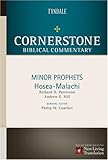
I’ve finished the commentary on Joel from the Cornerstone Biblical Commentary by Richard Patterson, who is also the author of the commentary on Joel in the Expositor’s Bible Commentary series.
Introduction
The primary theme of Joel is the day of the Lord, with a secondary theme of repentance. Patterson tentatively leans towards a pre-exilic date.
Commentary
God’s people had become obsessed with the pursuit of pleasure, and times of ease had resulted in spiritual and moral lethargy. Their spiritual service had degenerated into meaningless theology. Into this context, Joel urged people to follow his example in fasting and pleading with God. Patterson understands Joel 1 as a literal locust invasion which Joel takes as a harbinger of the day of the Lord.
As with other commentaries in the series, the teaching of Joel is connected to the rest of the Bible, and Patterson has a strong emphasis on the importance of a consistent personal prayer life, and stresses the need for regular confession of sin.
On the prophecy of the outpoured Spirit (Joel 2:28-32), Patterson sees Joel’s prophecy as being fulfilled in four stages – Pentecost, the Preset Age, the End of the Age and the Second Advent. He focuses on explaining the prophetic significance of the three major feasts Passover, Pentecost and Shelters.
On Joel 3:1-8 he lists some of the historical defeats that the nations warned of judgement suffered. He also, as in his Hosea commentary, draws out some end times implications without managing to fully nail his colours to the mast. He hints at a belief in an end times battle near Jerusalem, and talks about “Zion theology” which is “integral to NT eschatology”. Probably the limited space available and the desire of the editors not to favour one end times view above the others explains the lack of clarity.

